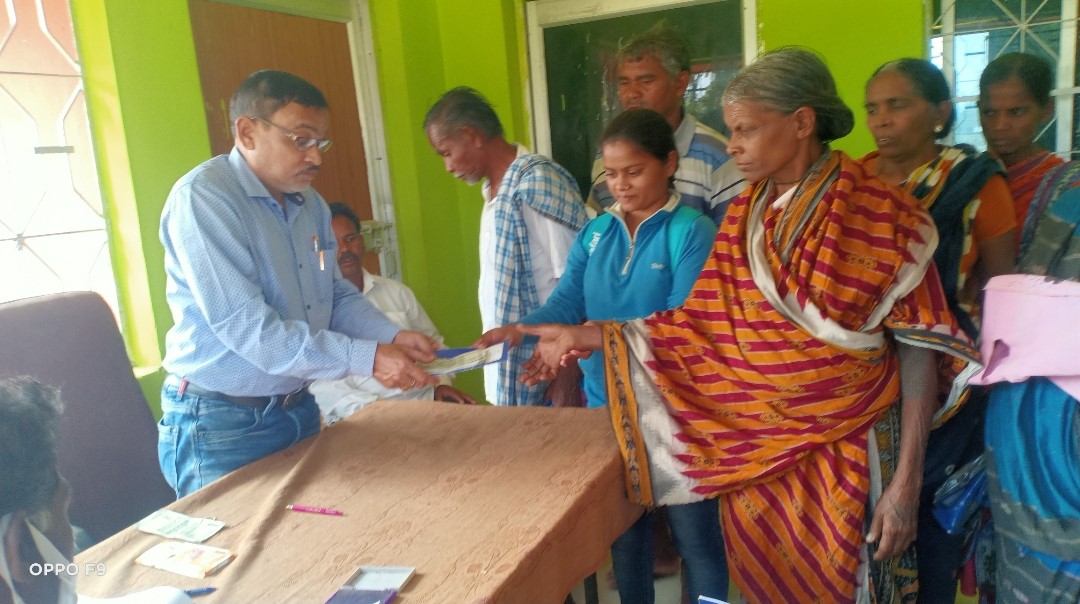Widow pension after a year of follow-up
StoryBy Chandrika Patnaik
23 August 2021
A COVID-19 response initiative creates awareness on social protection schemes, gets people their benefits, and builds local government capacities on gram panchayat level contingency plans.

Gohala Bag receives her widow pension card at the Block office.
Photograph by Pinky Bag
Pandarani is a village of just about 500 households in Loisingha block of Odisha’s Bolangir district. About 26% of the population are from the Scheduled Tribes and Scheduled Castes. Agriculture, farm, and wage labour are some of the key livelihood options for the people.
70-year-old Gohala Bag and her husband Akrura Bag, both daily wage labourers, lived in a small, two-room, mud house in Pandarani with their only son, Bhaga Bag. They cultivated Paddy in their meagre one-acre land, while the 28-year-old Bhaga went to work on construction sites as a daily wage labourer helping carry bricks and doing odd jobs. The land remains unused for the rest of the year due to the acute water scarcity in the area.
Six years ago, Akrura Bag died from a prolonged illness. Gohala got to know about the Odisha Government’s widow pension scheme, ‘Madhu Babu Pension Yojana’, from other women in the village, who had received the benefits. A year after her husband’s death, Gohala approached the Sarpanch of Kutenpali Gram Panchayat to help her avail the benefits of the scheme. The Sarpanch asked her to submit the copies of her Aadhar, Voter Identification and BPL ration cards. Gohala also had to produce a copy of the death certificate of her husband.
“I submitted the death certificate and other documents soon after my husband passed away and requested the Sarpanch to help me get the widow pension as soon as possible. After waiting for two months, I travelled to the Gram Panchayat Office in Kutenpali, met the Sarpanch again. I also met the Panchayat Extension Officer and other officials appealing with them for my pension, and resubmitted all the documents.” says Gohala Bag describing the struggle.
Gohala persisted with her efforts, applying thrice, following up with the Sarpanch both in their office and at home. Her repeated visits were unsuccessful, and extremely discouraging. Gohala decided to forego the scheme benefits that were rightfully due and stopped pursuing the officials.
On 27 December 2020, Gram Vikas, through its Community Mobilisers and Village Volunteers, reached out to the 550 households of Pandarani village. This was as part of a larger UNDP supported, short term, intensive project, ‘Response to COVID‐19 and Migration’ to create awareness and provide access to Social Protection Schemes in 18 blocks of six districts of Odisha.
The initiative created public awareness on schemes, facilitated the process of linking the left-out persons, trained local government officials on different state and centrally sponsored schemes, and gave a guideline to prepare Gram Panchayat level contingency plans.
Pinky Bag was one of the 263 Village Volunteers selected by the programme to support the eligible individuals to submit the necessary documentation for the applications to various schemes in the 18 blocks. During her door to door village survey to identify and list the deserving households, she met Gohala.
Recounting the first visit, Pinky says, “We realised she had given up all hopes of getting her pension. We insisted that she submit her documents so that we could process her request and help her get her pension.”
Pinky went to the Block Office and resubmitted Gohala’s documents for the fourth time in the first week of January 2021. On 20th of the same month, Gohala got the pension card and the first payment. “I finally got my pension after the Gram Vikas team processed my papers at the block office. I am getting ₹500 every month. The money helps me buy essential food items. I have decided to save a little every month so that I can buy food on those days when my son does not get work. I am really happy to have started getting my pension. I had given up all hopes of receiving it,” says a smiling Gohala as she cooks a meal for her son and herself.
A Community Mobiliser identifies eligible beneficiaries & facilitates filling of forms for submission at block level in Bolangir.
Photograph by Banamali Parida
ACKNOWLEDGEMENT
Sumati Majhi did the field reporting for this story. Priya Pillai and Ganesh Chakravarthi edited the story.
ABOUT THE AUTHOR
Chandrika Patnaik leads on content production within the Communications team.
RELATED BLOGPOSTS
Turning losses into gains: How Mallipanka farmers find success in new crops
Reviving agriculture: Mallipanka’s first strawberry farm story.
Ensuring dignity beyond life: supporting migrant families in their darkest hours
Gram Vikas ensures safe migration and dignified repatriation for deceased migrant workers, supporting bereaved families.
Collective leadership transforms ageing overhead water tank to secure household water supply for all
Kalakhadi’s aging overhead tank revived through collective leadership, ensuring sustainable water supply for the community.